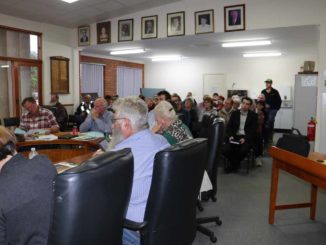In the interests of public safety three local food outlets have been shut down in Cobar over the past couple of months and a number of others have been issued with improvement notices.
Cobar Shire Council’s manager of planning and environmental services Stephen Poulter said most of the premises with identified problems have now complied with regulations.
He said one premises had a wide variety of problems with building cleanliness and staff training while others only had an issue in one particular area.
“We are working with them to ensure a consistent compliance level.
“There are a number of reasons why we feel the need that a premises goes from an improvement notice to a prohibition notice,” Mr Poulter told The Cobar Weekly.
“We believe there’s an imminent risk of danger to the public.
“If we found that the situation was grossly unsatisfactory, we then advise them that our intention is to close the premises.
“In all three cases where we have served prohibition orders we believed it was necessary to close those premises on the same day that we inspected,” he said.
“However we don’t just leave it there, we also try to work with them to re-establish business as soon as possible which we have done in all the particular cases.”
Mr Poulter said two out of the three of the premises that were closed by council have since been re-established.
Local cafes, restaurants, service stations, clubs, pubs (including Mt Hope and Euabalong), motels, mine camp kitchens, school canteens, the bakery, supermarkets and home-based businesses that prepare food all come under council’s jurisdiction.
However Council is not responsible for butchers, places that handle seafood, the nursing home or the hospital, all of which are in a high risk category and are inspected by the NSW Food Authority.
Mr Poulter said council staff regularly carry out ‘spot checks’ on local food outlets.
“There are a number of things that we check.
“We use a Food Protection Assessment Report which is used by all councils,” he said.
“It’s a report that is developed by the food authority and it contains a number of things in relation to hygiene, skills and knowledge, cleanliness of the premises, food temperatures and storage.”
He said food premises do not know in advance when inspections are to be conducted.
“It defeats the purpose, obviously because they could clean before we enter the premises,” Mr Poulter said.
“It’s a risk based approach whereby if a premises is found to be unsatisfactory we inspect them more frequently.”
Businesses that serve more high risk foods or those that serve vulnerable people such as seniors and young children (who are more vulnerable to food born illnesses) have a higher risk factor and so are inspected more frequently.
Mr Poulter said council staff have the power to enter a premises at any time and will also carry out inspections following complaints from the public.
“We request that the public inform council of any food related issues versus going on Facebook, so that we can thoroughly investigate all the issues,” Mr Poulter said.
“We have powers to request information, to take samples, to close premises, to impose required improvements, and we can prosecute.”
Mr Poulter said council is also working with the Market Day stalls that serve food and sell food products.
“We try to take a proactive approach and work with charities, sporting groups and not for profit organisations as well to try and heighten their level of understanding, skills and knowledge.”
Mr Poulter said not for profit groups had been granted a concession by the Food Authority as generally they sell low risk food products such as sausage sizzles and cakes.
“They are unlikely to sell raw food and high risk food and it is usually cooked on a single day, at a single event.”
He said while the risk to the public is a lot lower, council is still keen to talk to these groups to ensure they are using good food handling methods.


